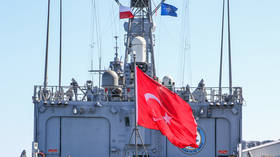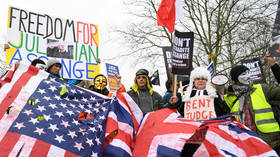'Stakes higher' in Idlib but NATO 'won't run to Erdogan's aid' despite efforts to have allies intervene in Syria

NATO will not offer anything more than words of support to its member Turkey despite Ankara's efforts to rally its allies after Turkish soldiers came under fire from the Syrian Army in the Idlib 'de-escalation' zone, RT was told.
NATO's collective defense pledge is "not applicable in the case of Turkey because we have an armed conflict on Syrian soil," Sergey Balmasov, an expert with the Russian International Affairs Council and the Moscow-based Institute for the Near East, told RT. Ankara requested an urgent NATO meeting on Friday, shortly after 33 Turkish soldiers were killed in an airstrike by the Russian-backed Syrian Army in the country's Idlib province. NATO has issued condolences but no military aid.
The US-led military bloc's founding treaty states that its members are duty-bound to defend each other only if one of them is attacked in Europe or North America. "Turkey's European partners understand this very well. They wouldn't want to get dragged into Turkish President Recep Tayyip Erdogan's territorial claims," Balmasov said, while admitting that "the stakes have grown higher" in Idlib in recent weeks.
Nobody in Paris or Berlin will run to Erdogan's aid, especially considering that he himself behaves at times as if NATO doesn't exist, and remembers about NATO only when he needs to.
NATO Secretary General Jens Stoltenberg argued that Friday's meeting in itself was "a clear sign of solidarity with Turkey." Balmasov added that the generic statements of support are probably all Ankara will get. He believes it is "very unlikely that [US President Donald] Trump will decide to quarrel with [Russian leader Vladimir] Putin because of Erdogan's actions," and "neither Americans nor anyone else will seriously fight because of Turkey."
#NATO has just met in solidarity with our Ally Turkey, following the death of Turkish soldiers near Idlib. We condemn the indiscriminate air strikes by the Syrian regime & Russia. This dangerous situation must be de-escalated & humanitarian access allowed: https://t.co/TxBqHO5NVFpic.twitter.com/XCatlnyB9k
— Jens Stoltenberg (@jensstoltenberg) February 28, 2020
Jamal Wakim, a history and international relations professor at the Lebanese University in Beirut, said that NATO member states will not move to "raise the tensions with the Russians," despite Erdogan's efforts to "pressure" them into intervening on his behalf in Idlib.
"That is why Erdogan has reverted back to blackmailing the European Union [with threats] about opening the Turkish border for Syrian refugees to cross through Turkey to Greece and other EU states," he told RT.
According to the Russian Defense Ministry, Turkish troops came under Syrian fire because they were acting within combat units of the terrorist group Hayat Tahrir al-Sham (HTS), an offshoot of Al-Qaeda in Syria, that launched an offensive within the Idlib 'de-escalation zone' set up by Russia and Turkey in 2018. Moscow also claimed that Ankara failed to notify it about the presence of its personnel in the area.
Also on rt.com The threat of a Russia-Turkey-NATO hot war over Idlib is a godsend for US foreign policyWhile agreeing that a serious response from NATO is unlikely, Vladimir Avatkov, a senior researcher at the Institute of World Economy and International Relations in Moscow, said that Turkey relies on Washington's help because it lacks sufficient resources to feed its own designs in civil-war-torn Syria.
The Americans, meanwhile, "have a long history of doing everything to disrupt Russian-Turkish relations and inject chaos in the region," the expert noted.
Turkey doesn't understand that it gradually brings the chaos closer to its own borders by aiding the US concept of spreading the chaos around Russia… Turkey's ambitions and the ideological element of its foreign policy overshadow its own national interests. The expansionist nature of its foreign policy trumps pragmatism.
Avatkov, who is also an associate professor at the Department of International Relations of the Russian Foreign Ministry's Diplomatic Academy, said the US will continue to "push Turkey towards greater escalation in any way they can, but won't engage in confrontation with Syria or Russia themselves."
Also on rt.com Syria has every right to fight terrorists in Idlib and Russia can’t interfere – MoscowThink your friends would be interested? Share this story!













